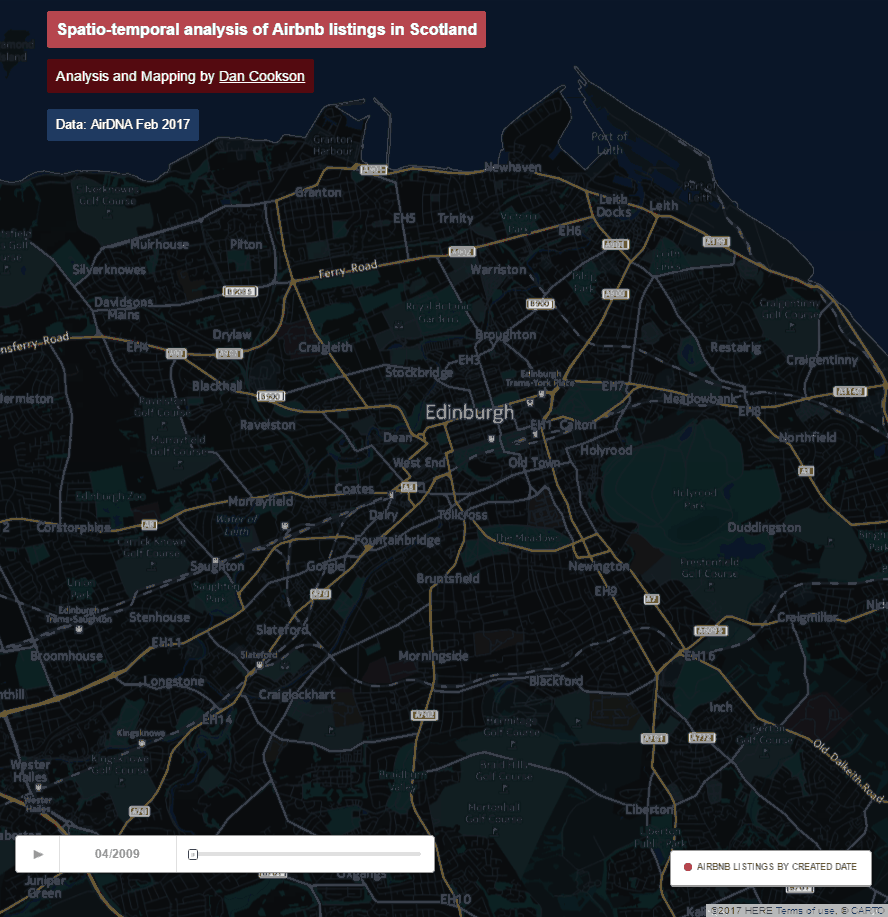Having recently spoken to a number of people about the impact of Air BnB in Edinburgh I thought it might be worthwhile taking a closer look at the growth of short term letting in Edinburgh and the potential consequences.
Dubbed a “community marketplace” the online service enables people to rent their properties as short-term accommodation in cities across the world. It is estimated that Air BnB is worth £1 million a day to the Scottish economy and yet it remains largely unregulated.
Dan Cookson is an independent market analyst who has carried out a large amount of research into what the council terms as SSCVA’s or Short Stay Commercial Visitor Accommodation very kindly provided me with this animated map that very clearly shows the growth in the market.
The city council in conjunction with Scottish Government is now seeking to clamp down on planning laws in an attempt to legislate against private home owners who list their properties for more than 90 days on Air BnB and other such sites. Councillors have raised issues such as noise pollution, refuse collection and community cohesion as areas of concern since the huge growth in numbers of properties that are being let this way.
Many people I have spoken to who live in the city centre have stories of visitors not understanding how key locks work and them buzzing other residents at all hours for access, or noise from people dragging suit cases up stairs, or not closing communal doors behind them. The stories are myriad and the level of concern amongst residents in the most popular areas of the city is increasing.
Edinburgh is not alone in beginning to look closely Air BnB with places like Barcelona and Dublin being currently involved in gathering information.
In Germany Berlin has banned short term rentals from May 2016, the new law entitled “Zweckentfremdungsverbot” bans the short-term let of entire apartments to tourists without a city permit. Berlin is similar to Edinburgh in that rents are rising and the population grew by 80,000 in 2015.The result is commercialised home-sharing has become a highly politicised issue in the city. According to estimates by the city senate, portals such as Airbnb, Wimdu and others have registered between 10,000 and 14,000 flats in Berlin which is almost as many as the city builds on average each year.
In addition to the very real concerns I have covered above there is another that has not been mentioned. I see this as perhaps the most important of all and that is what impact is the growth in the short-term rental market having on the availability of stock in the Private Rented Sector.
The current population of Edinburgh is approx. 489,000 and in the Council’s recent City housing strategy report the population is predicted to grow at a faster rate than the Scottish average with an additional 88,000 households living in the City by 2037.
As most people will know there is also a shortage of housing and levels of demand for properties in the PRS is only likely to increase. In fact private renting is now the cities second tenure with 22.7% of total stock being private rented and this is expected to grow to 35% by 2032.
At the moment, there is no real data that can show if there has been an adverse effect so the evidence is purely anecdotal. But as agents who operate in both the long term and short term markets we are seeing an increase in the number of properties let short term.
In addition, I have friends who used to let a nice spacious 3 bed flat on the Royal Mile to PRS tenants, last year they decided to go down the Air BnB route and they have not looked back since. This is just one of several people I know who have removed property from the PRS furthermore I have also spoken to other agents in the city and they are all telling me the same thing.
As an aside I think it’s also worth noting at this point that while the headline income figures may look very attractive at first glance this can be misleading. Short term letting comes with a much larger cost burden including council tax, cleaning, laundry tv license etc. All these need to be considered and then a true comparison between long and short term should be carried out. Finally, now there is so much supply any investor must also seriously consider what levels of occupancy they might expect. The result is that in many cases the long term PRS route can in fact offer better returns.
There has been much talk of “Generation Rent” in the press recently and Landlords have been given a bashing. It would be unfair to say they are sometimes portrayed as uncaring, capitalists who would kick out their tenants on a whim.
As we know the majority of landlords who have chosen to invest in the PRS are not like this at all. Most are small investors trying to do the best they can amongst increasing levels of regulation, changes to the legal frame works and ever increasing targeted tax changes. Many investors are feeling rather battered and bruised and might as result consider exiting from the market.
The combined result of all the above is that there are less properties available to rent to those people who want to live in the city for the long term. This leads to increased levels of demand, a constriction of supply and finally higher rents.
It is my opinion is that SSCVA’s need to be controlled not only as a result of issues outlined already but also around safety. Planning committee vice-convenor Cllr Alex Lunn has said: “Edinburgh takes the safety of visitors very seriously and obviously a lot of these visitors are staying in short-term lets.
“It’s our ambition to ensure our short-term lets have the same standard currently enjoyed by licensed Houses of Multiple Occupancy (HMO).
If this is successful then any new legislation could mean homeowners wanting to list their property for more than 90 days would have to seek planning permission to change the use from residential to commercial. Or if proposals are approved for a licensing or registration scheme, property owners would need to go through a licensing process similar to HMOs. Both these outcomes could include a fee.
I feel that some element of control of the of the short-term rental market is overdue and I wholeheartedly agree that those who operate in sector should be liable to the same level of regulation as those who rent out their properties in the PRS. I also feel that the growth of SSCVA’s has very likely been at the expense of the availability of the stock for long term rental.







